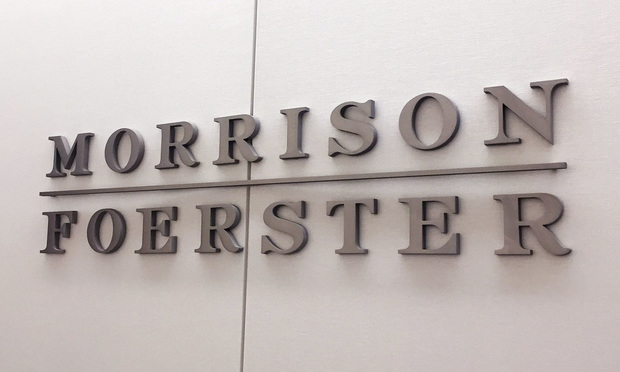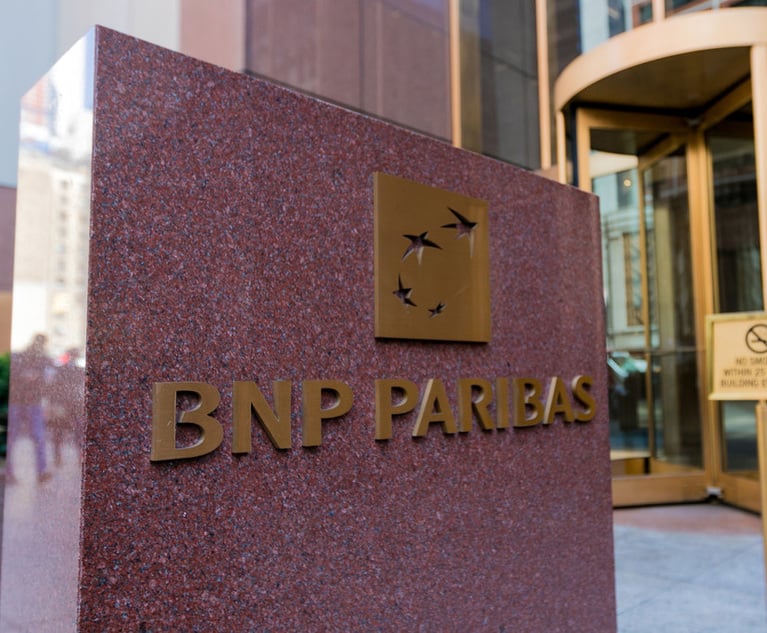MoFo Must Face Bank's Malpractice Lawsuit Over Bungled Offering
Morrison & Foerster could face millions of dollars in potential damages after a New York appellate panel revived a legal malpractice case brought by Macquarie Capital.
January 10, 2018 at 01:43 PM
5 minute read
 Morrison & Foerster offices in New York.
Morrison & Foerster offices in New York. Reviving a lawsuit brought by an Australian investment bank against its onetime law firm, a New York appeals court ruled Tuesday that Morrison & Foerster must face allegations that it should have done more to uncover fraud related to a Chinese coal company's U.S. public offering.
The Appellate Division, First Department ruled that Macquarie Capital sufficiently alleged a legal malpractice claim against Morrison & Foerster and “it may be reasonably inferred from plaintiff's allegations that it suffered damages attributable” to the law firm's conduct, including litigation expenses.
Macquarie's complaint doesn't allege a specific amount of damages, but it's likely Macquarie will seek tens of millions of dollars in its suit against Morrison & Foerster, including for losses stemming from an underlying Securities and Exchange Commission judgment against Macquarie, an investor suit, and damages for reputational harm and legal fees.
The case involves mining company Puda Coal, which conducted two public offerings in 2010 without disclosing a change in its ownership structure. It raised millions of dollars from investors selling shares in what was essentially an empty shell company.
Puda Coal conducted its operations in China through Shanxi Puda Coal Group Co. Puda reported in public filings that it owned a 90 percent interest in Shanxi Coal.
In the fall of 2010, Puda hired Macquarie Capital USA Inc. as an underwriter for a public offering. Macquarie claims it hired Morrison & Foerster to conduct due diligence for the transaction and to gain a full understanding of the operating and ownership structure of Puda and its subsidiaries.
Macquarie also hired private investigation firm Kroll Inc. to investigate the character, integrity and reputation of the individuals at Puda.
Kroll issued a report in December 2010 finding that Puda did not own a 90 percent interest in Shanxi Coal, contradicting Puda's public representations and reports.
Kroll provided its report to Macquarie through William Fang, an associate at the bank who emailed the report to other members of the Macquarie deal team. Fang also emailed it to Morrison & Foerster with a cover email that indicated “no red flags were identified.”
Neither Macquarie nor Morrison & Foerster picked up on the finding in the Kroll report that Puda did not own a 90 percent interest in Shanxi Coal. Further, on Dec. 13, 2010, Morrison & Foerster issued a letter confirming its due diligence findings and indicating that “nothing has come to our attention” that caused the law firm to believe that the offering documents contained false or misleading statements.
In spring 2011, Puda's fraud was uncovered and made public by the media, and the company was removed from the New York Stock Exchange.
In March 2015, Macquarie agreed to pay $15 million to settle SEC charges that it repeated false statements even though it had obtained the Kroll report.
The same month, Macquarie filed suit against Morrison & Foerster for legal malpractice for failing to adequately investigate Puda's ownership in Shanxi Coal and failing to properly review the Kroll report. Macquarie claimed that Morrison & Foerster's malpractice was compounded by its issuance of the inaccurate opinion letter.
Ruling on a motion to dismiss, Manhattan Supreme Court Justice Saliann Scarpulla dimissed the suit in 2016, finding Macquarie was in possession of the critical information at issue because it also had the Kroll report before the deal closed.
However, the appeals panel on Tuesday, composed of Justices Sallie Manzanet-Daniels, Angela Mazzarelli, Barbara Kapnick and Troy Webber, said Macquarie “sufficiently asserted that but for defendant's negligence,” it would have ceased its involvement in the public offering and avoided the fees, expenses and other damages it incurred.
The panel said Morrison & Foerster's argument that the Kroll report gave the bank “prior constructive notice of the material misrepresentations is unavailing,” clarifying a prior decision in Ableco Finance LLC v. Hilson, 109 AD3d 438 (1st Dept 2013).
Here, “although plaintiff acknowledges that it had possession of the investigative report, the information contained in the report cannot, at this stage, be described as explicitly putting plaintiff on notice and not requiring counsel's interpretation of the information,” said the appeals panel, noting the law firm cannot “shift to the client the legal responsibility it was specifically hired to undertake.”
The case now goes to back the trial court, where Morrison & Foerster is anticipated to answer the complaint.
Williams & Connolly partners Kannon Shanmugam and John Villa represent Morrison & Foerster. In a statement, Villa said, “We understand the First Department's ruling that the court is not in a position at the pleading stage to issue a definitive ruling on the dispute. We are confident that our conduct will be vindicated in further proceedings.”
When the case was filed, the bank was represented by Kasowitz Benson Torres partners Marc Kasowitz and Albert Shemmy Mishaan. However, the bank's lawsuit is now being led by Kevin Marino, principal at six-attorney firm Marino, Tortorella & Boyle.
“We are very gratified that the Appellate Division recognized Macquarie's complaint against Morrison & Foerster states a claim on which relief can be granted,” Marino said in a statement, “and we very much look forward to litigating the case.”
This content has been archived. It is available through our partners, LexisNexis® and Bloomberg Law.
To view this content, please continue to their sites.
Not a Lexis Subscriber?
Subscribe Now
Not a Bloomberg Law Subscriber?
Subscribe Now
NOT FOR REPRINT
© 2025 ALM Global, LLC, All Rights Reserved. Request academic re-use from www.copyright.com. All other uses, submit a request to [email protected]. For more information visit Asset & Logo Licensing.
You Might Like
View All

'Merciless' Filing Deadline Dooms Cuban Americans' Property-Trafficking Suit Against BNP Paribas, SocGen
4 minute read
After 2024's Regulatory Tsunami, Financial Services Firms Hope Storm Clouds Break

Trending Stories
- 1Don’t Blow It: 10 Lessons From 10 Years of Nonprofit Whistleblower Policies
- 2AIAs: A Look At the Future of AI-Related Contracts
- 3Litigators of the Week: A $630M Antitrust Settlement for Automotive Software Vendors—$140M More Than Alleged Overcharges
- 4Litigator of the Week Runners-Up and Shout-Outs
- 5Linklaters Hires Four Partners From Patterson Belknap
Who Got The Work
J. Brugh Lower of Gibbons has entered an appearance for industrial equipment supplier Devco Corporation in a pending trademark infringement lawsuit. The suit, accusing the defendant of selling knock-off Graco products, was filed Dec. 18 in New Jersey District Court by Rivkin Radler on behalf of Graco Inc. and Graco Minnesota. The case, assigned to U.S. District Judge Zahid N. Quraishi, is 3:24-cv-11294, Graco Inc. et al v. Devco Corporation.
Who Got The Work
Rebecca Maller-Stein and Kent A. Yalowitz of Arnold & Porter Kaye Scholer have entered their appearances for Hanaco Venture Capital and its executives, Lior Prosor and David Frankel, in a pending securities lawsuit. The action, filed on Dec. 24 in New York Southern District Court by Zell, Aron & Co. on behalf of Goldeneye Advisors, accuses the defendants of negligently and fraudulently managing the plaintiff's $1 million investment. The case, assigned to U.S. District Judge Vernon S. Broderick, is 1:24-cv-09918, Goldeneye Advisors, LLC v. Hanaco Venture Capital, Ltd. et al.
Who Got The Work
Attorneys from A&O Shearman has stepped in as defense counsel for Toronto-Dominion Bank and other defendants in a pending securities class action. The suit, filed Dec. 11 in New York Southern District Court by Bleichmar Fonti & Auld, accuses the defendants of concealing the bank's 'pervasive' deficiencies in regards to its compliance with the Bank Secrecy Act and the quality of its anti-money laundering controls. The case, assigned to U.S. District Judge Arun Subramanian, is 1:24-cv-09445, Gonzalez v. The Toronto-Dominion Bank et al.
Who Got The Work
Crown Castle International, a Pennsylvania company providing shared communications infrastructure, has turned to Luke D. Wolf of Gordon Rees Scully Mansukhani to fend off a pending breach-of-contract lawsuit. The court action, filed Nov. 25 in Michigan Eastern District Court by Hooper Hathaway PC on behalf of The Town Residences LLC, accuses Crown Castle of failing to transfer approximately $30,000 in utility payments from T-Mobile in breach of a roof-top lease and assignment agreement. The case, assigned to U.S. District Judge Susan K. Declercq, is 2:24-cv-13131, The Town Residences LLC v. T-Mobile US, Inc. et al.
Who Got The Work
Wilfred P. Coronato and Daniel M. Schwartz of McCarter & English have stepped in as defense counsel to Electrolux Home Products Inc. in a pending product liability lawsuit. The court action, filed Nov. 26 in New York Eastern District Court by Poulos Lopiccolo PC and Nagel Rice LLP on behalf of David Stern, alleges that the defendant's refrigerators’ drawers and shelving repeatedly break and fall apart within months after purchase. The case, assigned to U.S. District Judge Joan M. Azrack, is 2:24-cv-08204, Stern v. Electrolux Home Products, Inc.
Featured Firms
Law Offices of Gary Martin Hays & Associates, P.C.
(470) 294-1674
Law Offices of Mark E. Salomone
(857) 444-6468
Smith & Hassler
(713) 739-1250






